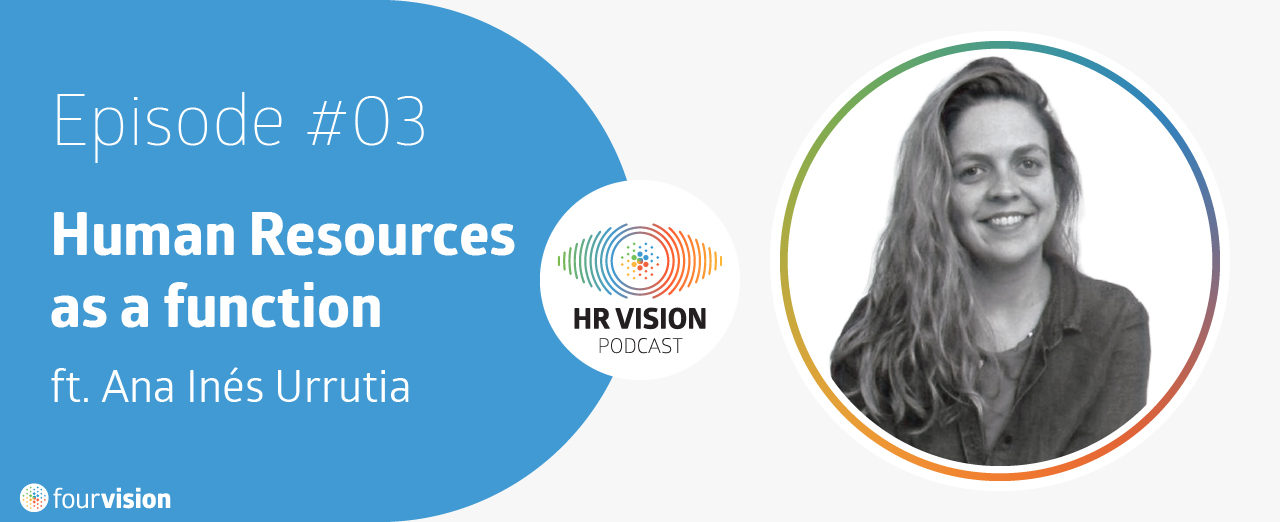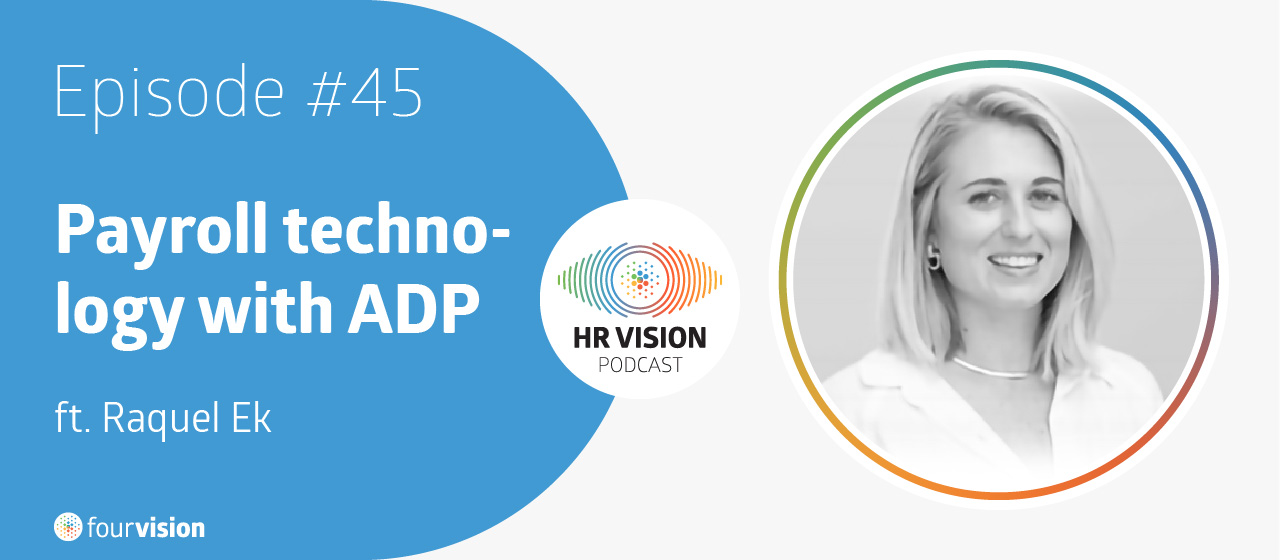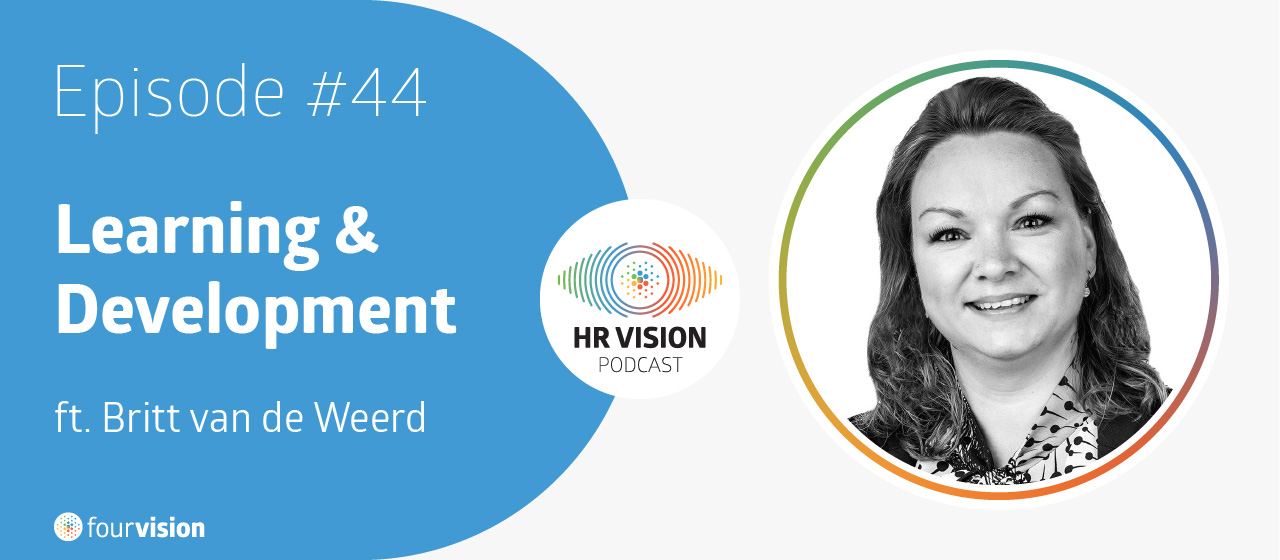Ana Inés Urrutia, a Microsoft Business Applications MVP and Dynamics 365 HR Consultant, comes on the podcast to discuss the broad topic of Human Resources as a function. We talked about her expertise, what she sees as the challenges in HR technology and trends to look out for.
At some point, discussing Cultural Fit, this article was mentioned.
Disclaimer: At the time this podcast was recorded, Ana was part of the FourVision team. That is no longer the case, but the good relationship remains, hence the publishing of this episode. You can follow Ana’s work at anainesurrutia.com
Ivo:
Hey everyone, and welcome to the HR Vision Podcast. I'm your host, Ivo. And every week I'm going to have a conversation that matters about HR. In this episode I have Ana Inés with me, so welcome Ana. How are you?
Ana Inés:
Thank you very much. I'm pretty good. Thank you.
Ivo:
Awesome. So Ana is an HR technology consultants at FourVision and today she's here with me to talk about a broad topic of human resources as a function. So Ana are you ready?
Ana Inés:
I am, I'm excited
Ivo:
Excited, good that's good. Alright so let's let's start, let's start with a small introduction about yourself and your professional background.
Ana Inés:
OK, awesome, so thank you very much for the opportunity of being here. I want to start saying thank you. It's awesome to exchange and talk a bit about HR with other people that are not our clients. So that's very good.
Ana Inés:
Well so I'm Ana, I'm implementation consultant here at FourVision I come from a very weird background because I'm a psychologist and I worked in HR for my entire career. Someday I joined a Microsoft partner company, they were implementing Dynamics HR. So I joined and luckily for me that journey never ended. So here I am in technology industry.
Ivo:
Alright. OK, so when did this start, the HR? Si you have a psychology education? Why pick HR as an area of expertise?
Ana Inés:
In my family it runs in the blood of my family, HR. My mother did that. Yeah, my mother did that in you know, but more on the payroll basis. So I always was with familiar with that. When I was in high school, I was lost and I didn't have any clue where to go. And after high school I decided to start a short course of HR and all my instructors were psychologists. So I thought "This is a good thing to do, if I go this way I may work in HR or may work as a counselor or whatever". And Luckily for me in-between while I was studying in university, I was able to work part-time jobs or internships or related with HR, that was something that was always there with me. It's been there all the time.
Ivo:
And then the career basically shifted that way. Yeah, I understand that. Share, if we go towards the topic itself, how how would you describe it in your own words? How would you describe HR as as a function?
Ana Inés:
Oh, that's a very interesting question. I think that is beyond the function. It is more like an understanding of the human side of the organization. How this is not only about the resources because, you know HR is always human resources, but you know about the understanding beyond the people and building culture. Building a good place to work. I don't think I can answer this so simply but, you know that I'm obsessed with this topic, so let me talk and talk for hours.
Ivo:
Let's go, we have time!
Ana Inés:
I think that HR is part of the basis of every organization and HR as a function should be an ally of the organization and the organization's goals. To, keep track and keep achieving things that are aligned with the business, I don't think I answered your question, but those are my thoughts.
Ivo:
OK so would you say that it's basically, correct me if I'm wrong, more than a function because basically it's organizing all the Human Resources within a company to achieve the company's goals. So it's basically it's a way of organizing. Putting people in the right place to achieve the goals of the of the company, so that that would be what you're saying.
Ana Inés:
Yes, but don't leave behind the fact that it's not only the right people in the right place, but also the right environment and you know, providing not only the persons but the environment...
Ivo:
The right conditions for the people to succeed.
Ana Inés:
Yeah, beyond the tools; the computer, the headset, or whatever. It's just more like an an internal feeling of good conditions to work.
Ivo:
OK, so it's not only the tangible things, it's also like the intangible things. People feeling safe, motivated, welcomed so they can actually perform at their highest level.
Ana Inés:
Yeah, exactly.
Ivo:
OK, so if you had to rank HR in a company like as a as a thing that you need inside the company, where would you rank it?
Ana Inés:
Of course, for me it's the 1st. The most important thing. So people you can't do anything well, you can do at this moment. We know that we you can, you know, use technology to get rid of people, but you will always, always, always need the human side. And it doesn't matter the industry you're working for, you always will need a human sighting in your company. So for me it's number one. But I do know that without the business relationship of departments that create the business; relationships and also sales and an alliance. Without that you were not able to provide anything to your team. So I think that there are those who are there like "You know these relationships in HR they're aligned together".
Ivo:
OK, I will add something to that which, would be the product itself, what you're selling, right? If you don't have anything to sell, you don't need people to work for, and you don't need business relations, so I think it's a combination of these three. Would you agree with me?
Ana Inés:
Exactly? It's a combination.
Ivo:
OK, let's go over challenges. We don't need to list all the challenges but, but we can go over. The ones that you remember. What do you think are the main challenges for HR professionals these days?
Ana Inés:
We have classic HR challenges and we have current challenges. So for the classic challenges we do have that HR is not always the main focus of the company, that HR doesn't always have a budget, so they don't have enough money to implement or to adopt solutions. So they keep working with paper with Excel spreadsheets. So those are two classical challenges that I have the opportunity to work with. So I know from the inside how that looks.
Ivo:
You've seen that a lot with the companies you've been working with?
Ana Inés:
Yes, I work for the government here in Uruguay and they were cluttered with paper. You know, they don't have budget and that's that because HR is cost 100%. It's not billable. As a cost, you're not a priority.
Ivo:
Let me just interrupt you there because you said cost and I think, I come from Portugal for example, and I think a lot of times HR is more about cost than investment. It is seen as a cost instead of an investment. So companies tend to just overlook it and "Nah, you can still work with that. You don't need a program to control people." Or to make the boarding a bit more swift or you don't need payroll data, you just write it everything down and you just send it to the bank accounts and those kinds of things. So, exactly what you're saying. It's overlooked because it's seen as a cost, not as an investment.
Ana Inés:
Exactly, 100%. Now that you are saying that, it is 100% an investment because. You can't have the people that are managing the entire human resources for your company working slow; not smart. It's just crazy.
Ivo:
It's actually creating more costs because if you don't invest in that, you're gonna have people taking more time to do their tasks when they could accomplish accomplish much more. If you could invest in them.
Ana Inés:
Yeah. So those two are classical challenges and we have a third one that I think it's even worse than what I already told you. That when HR has a very tiny budget, it is HR itself that decides to go and look after a solution without IT assessment or advice. So they start with a little budget and in a couple of years they can build a Frankenstein with multiple solutions, and that is terrible because it's a nightmare to work with. You have information spread all over, or locally stored, so that's not a smart way to work, and that's usually what I found in my experience. So that's even worse. That paperwork for me.
Ivo:
OK, so it's not only not having budget, but when they do, they don't know exactly where to start and they start mixing everything up.
Ana Inés:
Exactly. So for example, you need to invest in a recruitment solution. So you go there, but you also buy an Employee Development solution. So then you can't just cross information because there are different solutions. So instead of having only one that gathers everything. So that's the risk or HR taking the decisions without, you know working with IT.
Ivo:
Yes, I see. So those are classical, that you see everywhere. So what are the other challenges? The current challenges that you talked about?
Ana Inés:
So we have a current challenge right now. That is, you know and I don't want to be cliche, but the current situation that we are in, this lockdown pandemic. It's very difficult and I don't think that companies realized how to manage properly this kind of stuff. Having people at home with her families, trying to work, trying to be productive, trying to stay healthy and trying not to overwhelm employees. So that talent, I think that we didn't discover yet how to solve it. But I do think that we learn that being able to be close to provide a closer approach with employees that can make them feel better. But that is something that I'm seeing right now and with my friends. This is one of the current ones.
Ivo:
On a tangent to that. What are your thoughts on working from home? Because I think it's going to change dramatically what. What do you think about that?
Ana Inés:
For me it's very simple because I live alone. I don't have kids. That's very good, but I do think that sometimes it can take over your entire like day. So I work from the same table that I eat. And, you are always thinking in the back of your mind like "I should be working". Or "Maybe I could be doing this", but as you said this changed the way that we work. The organizations' investors realized that paying your rent might be a very non-necessary investment or cost so it can change the way...
Ivo:
You said. I'm sorry you're paying a rent for a building?
Ana Inés:
Yeah. So that might not be worth it.
Ivo:
No, I get that sorry. Yeah about that. I think it's going to change dramatically. But dealing with humans, that's the thing, everybody is different, right? You will have people that will welcome the change to start working way more days remotely, because they just adapted so easily. And you have people right now realizing, and we see this in a lot of companies and a lot of our friends and family, because everybody is in the same situation, and you see a lot of people now thinking like "You know what, I didn't think I missed the office, but I actually do because I have the kids running around and I can't focus the whole day." or even for your healthcare; for your mental health. You're closing the same place the whole day and you need to see people. And I think I think companies, I don't know. Correct me if I'm wrong or what what your thoughts are on this. But I think a lot of companies will need to realize that they they should give some flexibility depending on what people choose also to do.
Ana Inés:
Yeah, for me I think there's a game changer that the idea of needing to be present five days a week, 8-9 hours in an office, that will not longer be a way of working, I think. I mean, unless you need to work, doing something at at an industry or something like that. But yeah, the way managers or are seeing how the future is coming is changing. So that flexibility to play with that you are your own owner of how you manage your time. That you can be productive with that. And you can also be a good member of the family. You can be fulfilling your blanks.
Ivo:
And and I think companies are seeing that. Everybody went home and at least some studies that came out earlier this year said that the productivity in general didn't actually go down or anything. You know people are still productive even if they are at home. What they probably miss is the human contact more time to manage the time between the workspace. What is working, what is personal life, you know that's, I think, the main challenge.
Ana Inés:
Yes, exactly. I missed the coffee talk. The last time I was in office, it was in February 2019-2020. Yeah but I miss coffee talk. I mean I miss talking about football, talking about something else.
Ivo:
People underestimate that that coffee talk. You know, the the water cooler talk and it's important. It's just human relations. That's what it is.
Ana Inés:
It is yeah, 100 percent.
Ivo:
Any more challenges that you've noticed, you have seen these that are these days with the HR professionals?
Ana Inés:
I too think that we have something that is, it could be historic from the industry that we have a lot of competition within technology companies. That you know, we steal talent from one place to the other. So that's something. But I don't think it's worth it to go over that. I just think that before I joined FourVision, like two years ago or even more, I was recruiting people from the technology industry and and it was a nightmare. It was like head hunting. It was overwhelming, challenging and also for the candidates. But yeah, I think that the ones that we already discussed are the main ones.
Ivo:
But this one you were talking was when you're trying to find someone and the market is actually very small. There's a very specific position, so it's a very recruitment-related issue, right?
Ana Inés:
It is a recruitment related issue yes.
Ivo:
OK, I think we gave a general good idea of the challenges. So the next step would be the trends. What are the HR trends that you're seeing that that people should be aware of?
Ana Inés:
That's awesome. I mean,there are different levels, I think. There are trends that I see and there are trends that I would like to see. The one that I see is that we are using, luckily for us and luckily for the listeners learned, one of the lessons learned from this pandemic is that we are putting a lot of effort into making people happy and taking care of wellbeing. So that is being a trend and you can see that, for example with the alignment that Microsoft did with headspace so you can see that big companies are giving the sign to invest in the wellbeing of employees. So that is a trend that I'm very happy about. So I think that's the path. Yeah. Go ahead.
Ivo:
Do you think it was already coming before the pandemic, and the pandemic only accelerated it? Or have you seen it before or, like the pandemic just started off?
Ana Inés:
I've always seen HR working closely to build a better culture and to provide a better environment, but right now. At what I'm seeing right now, I think that this is a result of what we discovered. We have lots of people overwhelmed and fill in terrible with this whole situation. So it is a number one priority for us.
Ivo:
Alright, so that's the first trend.
Ana Inés:
Yes. The second trend is that we're investing in automation a bit more. So when I say we I talk about HR. Luckily we are investing in automating a bit more in some processes. Because as I told you at the beginning and we have lots of manual and administrative tasks that we do in HR and we're realizing that it is not that much. The investment that we need to do to improve the process. So for example, we have the Power Virtual Agents and these are like bots that we can build and they can solve easy challenges. We can integrate that with Teams and we can solve easy challenges. We also have like this Teams app connected with Dynamics HR to help them the employees to manage leave balances. So that is something very easy that could change your employee experience in seconds. So investments in technology, that's the second trend that I'm seeing. Yeah, I don't think I see anything else.
Ivo:
Regarding this one and then, I'll suggest the third trend. But regarding regarding this one. Do you think there's an overwhelming cadence of these type of tools surging in the market as well? Because I think for an HR professional, when you're looking for a tool, you might be a bit overwhelmed depending on the type of company. Of course, if you're talking about a huge company, you already know there are like two or three players basically. But for the midground like the mid level companies, actually FourVision works for that mid-level of companies there's plenty of solutions that you can go from a wide range. You probably aren't looking for something that streamlines the whole process from end-to-end. But you are also sometimes looking only for a tool for recruitment because you don't have enough budget. Do you think it's a - there's an overwhelming range of tools that you can choose from?
Ana Inés:
I think so, and if you are an HR analyst and you Google "recruiting tools", I didn't do that. I will do it after this this recording, but I didn't do that. I'm pretty sure that if you do search for that. You will be overwhelmed in a second, so it's very important to work closely with with IT and to take like the sorry with IT an to be very cognizant about their decision. Of investing in technology.
Ivo:
Yeah, to understand what are the real needs and what are the requirements.
Ana Inés:
Yes, one of the things that we underestimate is the impact of the adoption of that technology. So if I decide to invest in whatever you know, in a bot for example. I don't think HR is thinking about the adoption for the employees or how the learning curve is going to be, or stuff like that. So they don't consider some of the very important things in order to have a successful experience. So like the big picture, that's what I'm trying to say.
Ivo:
I see. OK, now I'm gonna throw you a a third trend. I don't know if you agree, but you know we are all. You work, of course, in HR. I work in marketing, so it's a different area, but I applied myself so I deal with HR. You know, when you apply to a position when you're looking for jobs or or whatever. And I see I personally see a trend, or maybe because in my career I'm looking as well into more into that which is the alignment between the culture of the company and the culture that the employees are looking for and viceversa. I don't know if you believe this is a trend, but like the employer branding is in high standards right now and everybody is talking about this. And like fitting the culture of the company, with the culture that employees are looking for. I see this is a trend. Do you know?
Ana Inés:
Yes, I agree 100%. Employer branding is the trend for I think a few years now, but lately it's one of the things that we're putting a lot of effort in because it's the only thing; the only way that we can build a brand outside of our organization is with the prospects and how we we put our company out there. You know, in social media and stuff like that. So yeah, it's very important. I think that this is a good trend that will that will you know obligate people from HR departments to provide a better experience. And to help build a build a better brand and the cultural field that you mentioned is something very important. And I have a bittersweet feeling with that because on the one hand, I do think that it's very important to have people aligned with your culture, but on the other hand, I do think that you need some people that are not so aligned to you, know, disrupt like how everything is built.
Ivo:
So I remember we talked about this in an article that we wrote together for the blog. So I'm gonna put the links on the comments of the podcast because yeah, you should hire for cultural fit. But you should be aware as well that she, when you don't do that, you also are pulling people that are different. That can give you a different perspective on issues on a particular job or or or something like that. Yeah, that is a good one.
OK, this was a great talk. I don't know if you have anything, anything else that you like to mention regarding HR.
Ana Inés:
No, I mean I'm very passionate about this. As you can see and I can talk for hours. But no, I think that we're getting to a point where companies are realizing the value of investment in this area. And as you said, investment not cost. So yeah, luckilyy for us, we're getting there. And as FourVision we're going to try to help companies to work better.
Ivo:
Awesome, alright then. Thank you so much for your time. This is a great conversation and we'll see you next time in the next episode of HR Vision.
Ana Inés:
Sounds awesome.
Sign up to receive email updates
Enter your name and email address below and I'll send you periodic updates about the podcast.







